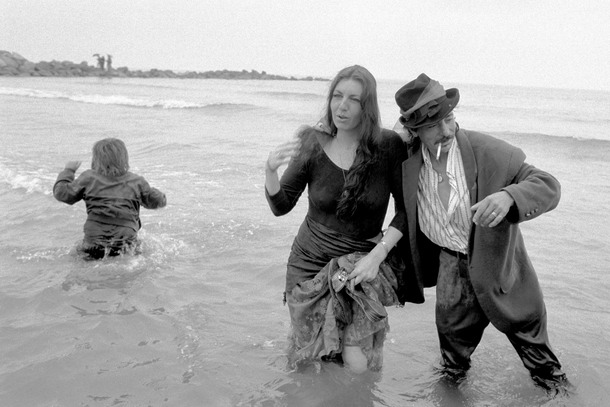Religion
To this day, the official religious dogma – be they Christian or Muslim, have not taken an preponderant place in Roma life. One has to say that all Roma in the world believe in God, but that this belief takes sometimes other forms than among the general population.
Officially, a large part of the Roma in the Balkan (Ex-Yugoslavia, Bulgaria, Macedonia and Albania) and the Crimean Roma are Muslims. One can find some Muslim elements in their everyday life: their names, cooking, clothes and some ceremonies. All other Roma are Christian, catholic, orthodox, some protestant (in Latvia, Estonia, Finland and the Swedish Tattare, for example).
But the traditional Roma beliefs are very much dualistic: on the one hand, Del or Devel [God], the source of all goodness, light and the protector of men; on the other hand, Beng, the Devil, the source of evil, darkness and the tempter of men. This dualistic belief may be the trace of old oriental dogmas. It is nevertheless nowadays impossible to know which religion the Roma ancestors had in India.

Origins
The investigations of the current Romani religious terminology by the Russian-Roma writer and scientist Leksa Manuš (1942-1997) show their relation to old Shivaistic concepts. Such words as rašaj [priest] or trušul [cross], used nowadays among Roma are closely related to Shivaistic terms stemming from rishi “a Shiva priest” and trisula ” Shiva’s trident”. Leksa Manush found other words giving the hint that Roma ancestors in India were Shiva believers.
To this day, some pagan beliefs have subsisted among Roma – either Roma or of local origins, from the countries they travelled in. The belief of the strength of the words, words may bring good or bad luck. As a result, in all Roma dialects, one can find sometimes almost cliché like formulas.
One uses these formulas in a conversation when a Rom speaks about something bad or terrible. It then protects him and the others from bad luck. Roma also believe in the jakhalimos, the evil eye, and there are formulas to protect oneself. Swear words solaxa (sovela, sovlja) are believed to be powerful and curses, armaja (armanja) are believed to bring bad luck to the ones they are addressed to.
All this has nothing to do with either the official Christian or Muslim religion, although sometimes swearing and cursing are made in church or in the mosque, but always when Roma are among themselves and no priest or imam is present.
New Churches
In the last years, several other congregation have been actively proselytising Roma. Among them one finds the Pentacostal churches – among Kelderaša, Lovara and Sinti in Western Europe and America as well as in Finland, the Baptists and the Jehovah Witness – for example in Bulgaria.
Beliefs
An old belief among Roma – still surprisingly common nowadays – is that the dead are free to travel back and forth between the world of the living and the world of the dead. Many Roma are extremely afraid of the dead. These “living dead” are called čoxano or čovaxano – simply ghosts. Ghosts are those dead whose soul, for one reason or another remained trapped with besides his body and thus hurts him. He may have committed an inexcusable offence during his life or simply have sold his soul to the devil.